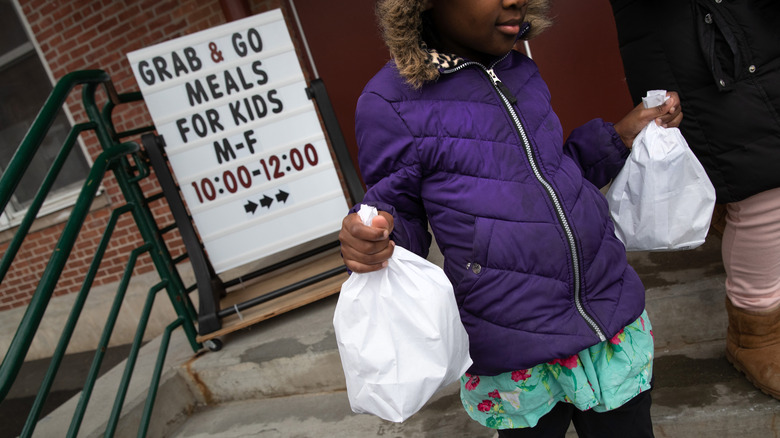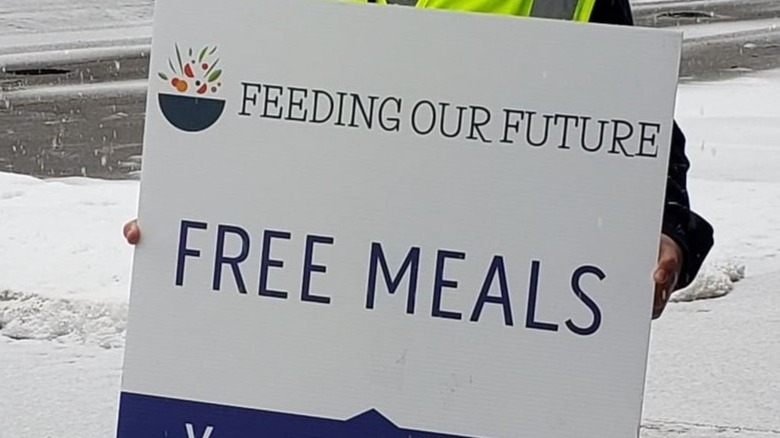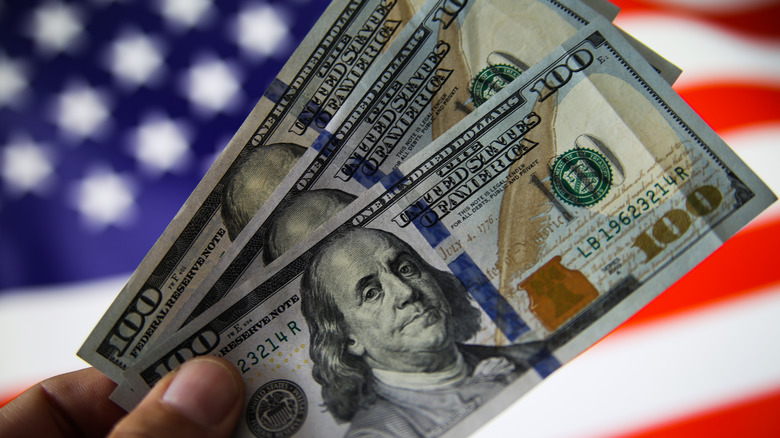How $250 Million Was Stolen From A Pandemic Food Program
U.S. Attorney Andrew M. Luger has called the swindle "a brazen scheme of staggering proportions," per the Justice Department. If they had gotten away with it, the 48 perpetrators charged with fraud and bribery per NBC News, would have stolen no less than a quarter of a billion dollars from the Federal Child Nutrition Program, a USD initiative originally set up to ensure that children from low-income families have access to nutritious meals.
Before the COVID-19 pandemic, any entity that wanted to be a part of the federal aid program had to sign up with a sponsoring organization. These sponsors were responsible not just for monitoring the activities of places that would distribute the food, also known as sites, sponsors were also expected to help the sites claim reimbursement. In return, the Justice Department said these sponsors could keep 10% to 15% of the funds disbursed, to recoup their administrative costs, per the Justice Department.
But because of the chaos triggered by the pandemic, the USDA decided to waive some of the requirements needed to join the program. For instance, for-profit restaurants would now be allowed to take part in the program, and offsite distribution of food aid could cover children who were not part of the educational system. What resulted is what one FBI agent described as "an astonishing display of deceit," per Associated Press.
Feeding Our Future is accused of working with fake feeding groups
In an in-depth look at the scheme, the Justice Department accused the Minnesota-based non-profit group Feeding Our Future, which was already registered with the state as a sponsor in the Federal Nutrition Program, of recruiting different people who would then falsely claim they were feeding thousands of children a day by submitting falsified documents issued by shell companies.
As an example, a small restaurant in Minnesota was allegedly used as a front by two defendants, who then billed the government because they purported to have served 1.6 million meals in the first 11 months of 2021, per Associated Press. They even listed the names of 2,000 children, only 33 of whom were actual students. The Justice Department said fake documents supporting a non-existent feeding program were then turned in to Feeding Our Future, which would supposedly process the documents knowing they were false. NBC News says Feeding our Future claimed it had 250 food distribution sites, and it billed the government for serving more than 125 million fake meals. The money collected from the scheme was eventually used to buy "luxury cars, property, and jewelry."
$100 billion could have been lost to fraudulent COVID-related schemes
AP says Feeding Our Future got on the Minnesota Department of Education's radar because the government bureau noticed the rapid increase in the number of sites the non-profit was sponsoring and the amount of money it was claiming, which is when staff began looking at its applications more carefully. The non-profit's founder, Aimee Bock, then claimed her group was the subject of discrimination and sued the government. That suit has since been dismissed.
While Feeding Our Children may be guilty of stealing more than the $250 million in COVID relief funds initially identified by investigators, that amount is a drop in the bucket, when seen within the context of the almost $100 billion the Secret Service believes may have been stolen from COVID relief programs. That amount, per PBS, doesn't even include the cases being pursued by the Justice Department. By the end of 2021, the Secret Service says it had been able to seize $1.2 billion in investigating unemployment insurance and loan fraud; it has also returned $2.3 billion of funds that were falsely claimed. One Florida agent said that while they wouldn't be able to stop fraud, they could "definitely prosecute those that need to be prosecuted and we can do our best to recover as much fraudulent pandemic funds that we can."


